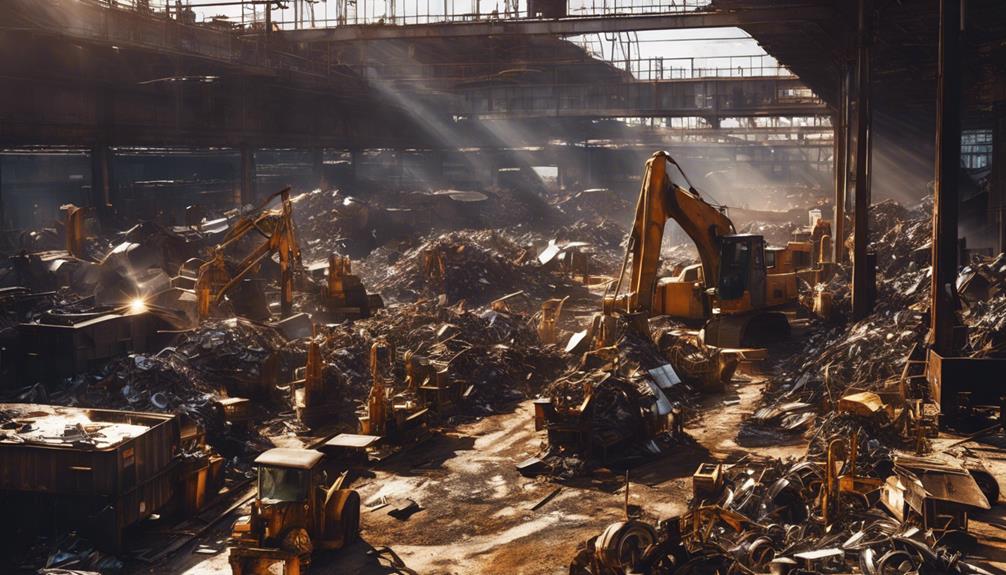If you're involved in the scrap metal industry in Washington, understanding the Scrap Metal Processor Bond is crucial for your operations. This bond not only ensures compliance with local regulations but also plays a significant role in establishing your business's credibility. You might wonder how it impacts your relationships with customers and suppliers, or what the eligibility requirements entail. As you consider these factors, you might find yourself questioning whether the benefits truly outweigh the costs associated with securing the bond.
Overview of Scrap Metal Processing
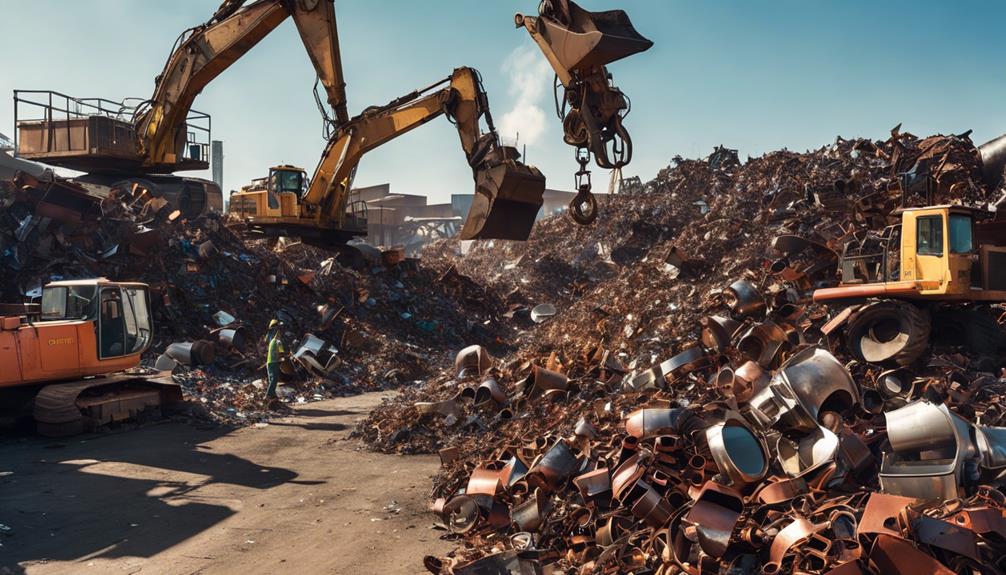
Scrap metal processing involves collecting, sorting, and recycling various types of metal waste to reclaim valuable materials.
You start by gathering scrap metal from various sources, like construction sites, automotive repairs, or household items. Once you've collected the metal, sorting it becomes crucial. You'll need to separate ferrous metals, like iron and steel, from non-ferrous metals, such as aluminum, copper, and brass. This step ensures you maximize the value of the materials you're working with.
After sorting, you'll process the metals for recycling. This might involve shredding, baling, or melting the scrap down to prepare it for resale.
It's essential to ensure the metals are clean and free from contaminants, as this affects their market value. You can sell the processed metals to manufacturers who'll use them to produce new products.
Importance of the Bond
In the world of scrap metal processing, securing a bond is crucial for ensuring financial protection and compliance with legal regulations. This bond acts as a safety net, providing a financial guarantee that you'll adhere to industry standards and local laws. If you fail to meet these obligations, the bond helps cover any potential damages or penalties incurred, protecting both your business and your clients.
Additionally, these bonds are often required for various licenses and permits, reinforcing the importance of being compliant with Arkansas regulations.
Moreover, having a bond enhances your credibility in the eyes of customers and suppliers. It shows that you're serious about your operations and committed to maintaining a trustworthy business. This can lead to increased opportunities, as clients often prefer dealing with bonded processors, knowing they're working with a reliable partner.
Additionally, many states require scrap metal processors to obtain a bond as part of their licensing process. Without it, you could face fines or even lose your operating license.
Eligibility Requirements
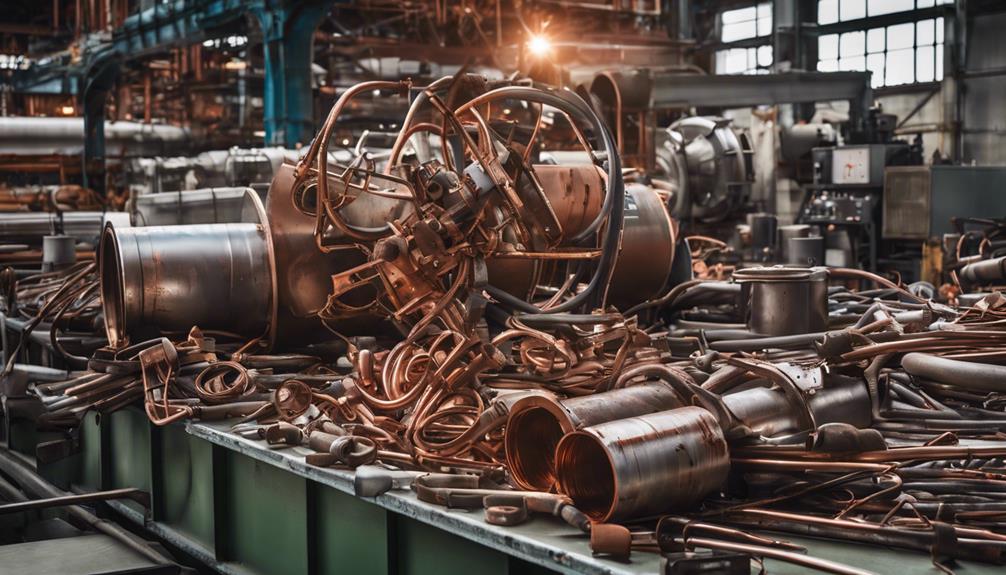
Understanding eligibility requirements for obtaining a scrap metal processor bond is essential for your business's success. To qualify, you'll need to meet specific criteria set by the state.
First, make sure you're operating legally as a scrap metal processor. This means having the necessary licenses and permits for your business.
Next, you'll need to demonstrate financial stability. Insurers typically look at your credit score and financial history to assess your ability to fulfill obligations. A strong credit profile can help you secure better bond rates. Additionally, some states may require you to provide a financial statement or proof of assets.
You should also be in good standing with regulatory agencies. Any past violations or penalties might hinder your eligibility. It's crucial to maintain compliance with local and state laws regarding scrap metal processing.
Lastly, be prepared to pay a premium for the bond. The cost often depends on your creditworthiness and the bond amount required by the state.
Application Process
Navigating the application process for a scrap metal processor bond can feel overwhelming, but breaking it down into manageable steps makes it easier.
First, you'll need to gather the necessary documentation, including proof of your business structure, identification, and any relevant licenses. This information helps establish your credibility and meets the requirements set by the bonding company.
Next, research bonding companies that offer scrap metal processor bonds. Look for those with a good reputation and experience in the industry.
Once you've selected a company, reach out to them for an application form. Complete the form accurately, providing all requested information. Be prepared to answer questions about your business practices and financial history.
After submitting your application, the bonding company will review it. They may request additional documentation or clarification, so stay responsive.
Once approved, you'll receive the bond terms, which you'll need to read carefully. Finally, make sure to sign the bond and pay any applicable fees to finalize the process.
Following these steps will help you navigate the application process smoothly and get your scrap metal processor bond with confidence.
Bond Amount and Costs
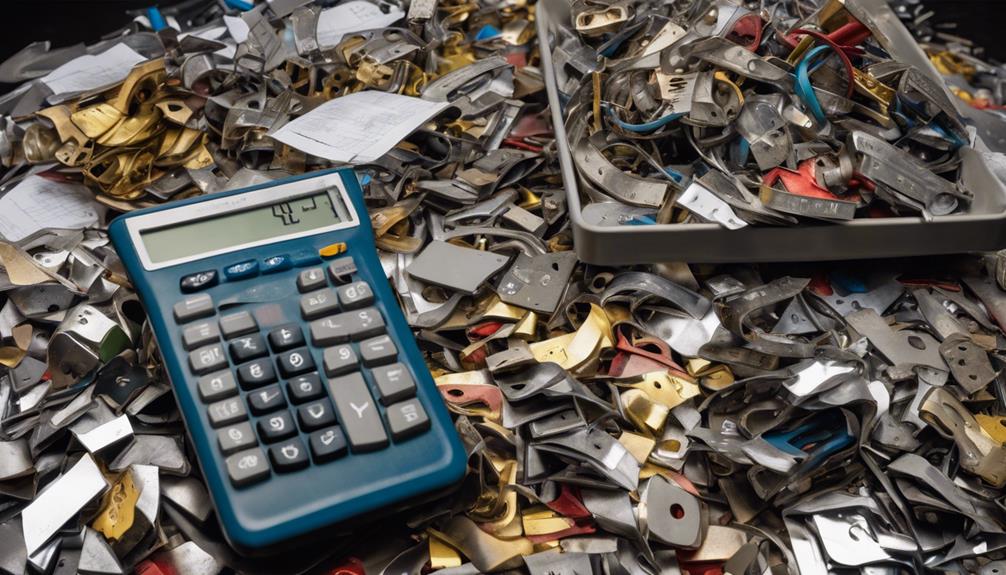
When it comes to scrap metal processor bonds, knowing the bond amount and associated costs is crucial for your budgeting. Typically, the bond amount required for a scrap metal processor in Washington can range from $10,000 to $50,000, depending on your business size and the volume of scrap processed. The exact amount will often be specified by your licensing authority, so it's vital to check with them for precise requirements.
In addition to the bond amount, you'll need to consider the premium costs involved in securing the bond. These premiums usually range from 1% to 15% of the total bond amount, influenced by factors such as your credit score, business history, and financial stability. If you have a strong financial profile, you might qualify for lower premiums, saving you money in the long run.
It's also essential to factor in any additional fees that may arise during the bonding process. Some surety companies may charge processing fees or require collateral.
Regulatory Compliance
Regulatory compliance is essential for scrap metal processors to operate legally and avoid costly penalties. You'll need to familiarize yourself with local, state, and federal regulations governing scrap metal handling and processing. These rules often include licensing requirements, reporting obligations, and specific practices for tracking and storing scrap materials.
Make sure you stay updated on changes in legislation. Non-compliance can lead to fines, revocation of licenses, or even criminal charges. Implementing robust internal policies and procedures can help you meet these regulations effectively. This often involves training your staff on compliance protocols and ensuring that everyone understands their responsibilities.
It's also crucial to maintain accurate records of all transactions, including purchases and sales of scrap metal. These records serve as essential documentation in case of audits or inspections.
Benefits for Processors

The benefits for scrap metal processors extend beyond compliance and legal operation; they can significantly enhance profitability and operational efficiency. By securing a bond, you demonstrate your commitment to ethical practices, which can attract more clients and suppliers. This reputation can result in increased business opportunities, as more people trust your operation.
Additionally, having a bond can streamline your relationships with local authorities and regulators. When you show that you're compliant with regulations, you reduce the likelihood of inspections and audits, allowing you to focus on your core business activities. This not only saves time but also minimizes potential disruptions.
Moreover, a bond can offer you a competitive edge in the marketplace. Many customers prefer working with bonded processors, knowing they're dealing with a legitimate and responsible business. This preference can translate to higher sales and potential long-term contracts.
Lastly, the financial security that comes with being bonded protects your business against potential claims or liabilities, further solidifying your operations.
Consumer Protection Measures
A strong reputation and the trust of clients don't just benefit scrap metal processors; they also play a vital role in consumer protection measures. When you choose a reputable processor, you're ensuring that your transactions are secure and fair.
Licensed processors are obligated to follow regulations that protect you from fraud and unethical practices. This compliance is similar to the role of debt consolidator bonds, which ensure that companies adhere to industry regulations and provide compensation for any potential misdeeds.
To safeguard your interests, always verify that the processor you're dealing with holds the necessary licenses and bonds. This not only indicates compliance with state regulations but also assures you that they've the financial backing to compensate for any potential damages.
Additionally, many processors implement transparent pricing structures, ensuring you know exactly what you're paying for.
Ask for written estimates and receipts; this documentation serves as proof of the transaction and can protect you in case of disputes.
Common Challenges Faced
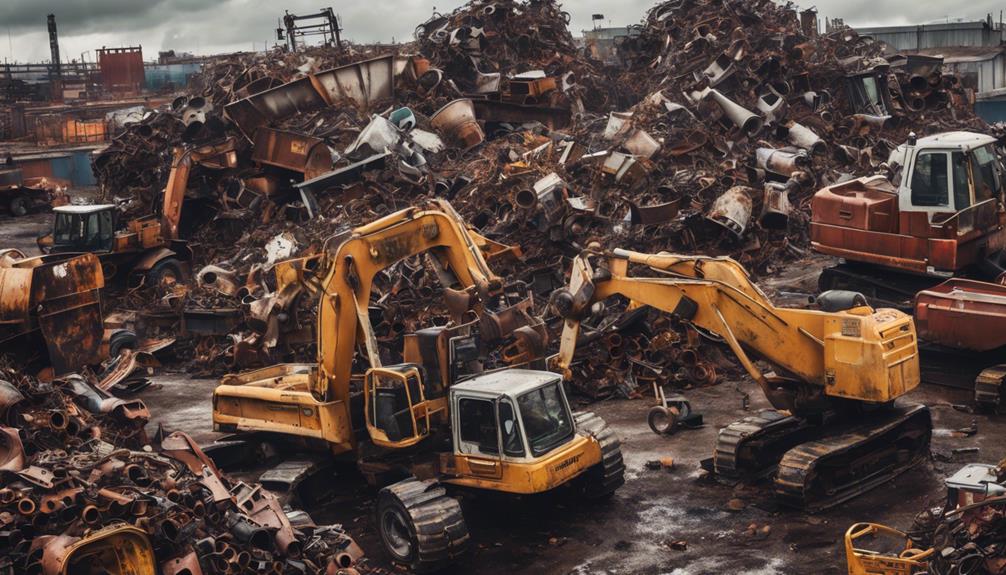
Navigating the scrap metal processing industry can present various challenges for both processors and consumers. One major hurdle is fluctuating market prices. You might find that the value of scrap metal changes daily, making it hard to predict profitability. This unpredictability can impact your budgeting and pricing strategies.
Additionally, regulatory compliance is a significant challenge. You need to stay updated on local, state, and federal laws surrounding scrap metal processing. Failing to comply can lead to costly fines or even revocation of your license.
Another concern is the quality and consistency of the materials you receive. You often deal with mixed loads that may contain contaminants or non-metal items, complicating processing and lowering profit margins.
Moreover, competition is fierce. You must differentiate your services to attract and retain customers, especially in a market with numerous players.
Lastly, safety is paramount. The scrap metal industry can be hazardous, and ensuring the well-being of your employees requires ongoing training and investment in safety equipment.
Future of Scrap Metal Industry
As demand for sustainable practices grows, the future of the scrap metal industry looks promising. You'll notice that more businesses and consumers are embracing recycling, pushing demand for scrap metal higher. This shift not only helps the environment but also creates new opportunities for processors like you.
Technological advancements are also reshaping the industry. Innovations in sorting and processing equipment allow for more efficient operations, increasing recovery rates and reducing waste. By investing in these technologies, you can set your business apart and maximize profitability.
Moreover, regulations regarding waste management are tightening. You'll need to stay updated and compliant, but this can work in your favor. Companies that prioritize responsible sourcing are more likely to partner with scrap metal processors that adhere to these regulations.
The global market for scrap metal is expanding, driven by urbanization and infrastructure development. This opens doors for you to tap into new markets and diversify your offerings. By staying adaptable and proactive, you can thrive in this evolving landscape.
In short, the future looks bright for those ready to embrace change and commit to sustainable practices in the scrap metal industry.
Conclusion
In conclusion, securing a WA Scrap Metal Processor Bond is crucial for your business's success in the scrap metal industry. Not only does it ensure compliance with regulations, but it also builds trust with your customers and suppliers. By understanding the bond's importance and navigating the application process, you can enhance your credibility and safeguard your operations. As the industry evolves, staying informed about these requirements will help you thrive and maintain strong relationships in the marketplace.

